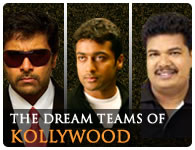| |
When something happens twice, you
can call it a coincidence. But when
it repeats four times in a row, it
is difficult to see it as just a coincidence.
That is why we are discussing a queer
aspect of Gautham Menon movies, a
hint of tragedy. This is nothing but
a musing that occurred while thinking
about all the Gautham Menon films
over the years, Minnale being the
lone exception to this. This musing
makes no attempt to be judgmental
about the director’s style of
film making, its quality or any other
technical or non-technical aspect.
It is just an observation from a normal
moviegoer’s perspective of the
seemingly inseparable element of a
Gautham movie- death, mostly of a
female lead.
Kakka Kakka had Maya (Jyothika) being
tragically shot down by the antagonists,
Vettaiyaadu Valaiyaadu is best remembered
for Aradhana’s (Jyothika) close
escape from a certain death, but one
should not forget the killing of Kayalvizhi
(Kamalinee Mukherjee) which comes
early in the first half. Then, in
Pachchaikili Muthucharam, it was Jyothika
again, this time playing a negative
role, being gunned down by the protagonist
Sarath Kumar. Finally, it is down
to Vaaranum Aayiram where one of the
female leads (there are three of them,
we don’t want to spoil the suspense
for those who are yet to watch the
movie) is killed by fate conspiring
against her, or should we say, the
conspiracy of Gautham’s script.
|
|
|
| |
A Gautham Menon script is certainly
not a safe place for a female lead
character to be in. They are always
in some kind of mortal danger, it
seems. Always being pursued for the
dint of being associated with the
rather adventurous and dutiful male
lead, that was the case in KK and
VV. PM was a case of novel scripting,
putting an actress in a zone that
Tamil movie actresses have seldom
been in, while in Vaaranum Aayiram,
it was neatly written in by Gautham
as fate. Different as they may seem,
all four situations resulted in the
same eventuality for the character
in question.
We are not trying to interfere with
a director’s or scriptwriter’s
freedom here. We also have to agree
that death and mortal fear have an
impact on the story that no other
twist can have and Gautham uses it
well at key points in his movies.
He does not deal in high voltage sentimental
scenes, tear jerking dialogues or
those touching final moments when
one character lies on another’s
lap delivering an extended farewell
with a good number of bullets having
passed through his/her body. But he
does manage to shock us, touch us
and move us at the same time. We may
even call him the Modern Tragedy Master
of Kollywood.
|
|









